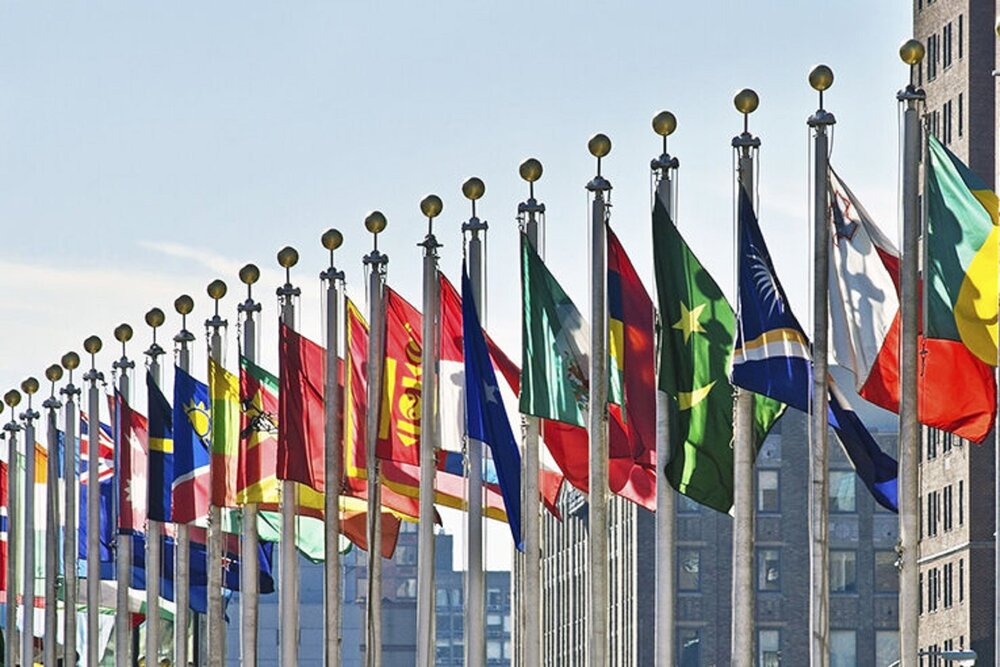Hawzah News Agency –The Islamic Republic of Iran has been often misrepresented in the mainstream media as an isolated country unwilling to develop friendly and lasting relationships with other countries. The following report tries to explain, based on the views of the Leader of the Islamic Revolution, the principles which govern the relation of Iran with the countries around the world.
In his televised speech with the people of Qom that was delivered on January 9, 2022, Imam Khamenei, the Leader of the Islamic Revolution, regarding Iran’s foreign policy, stated: “The refusal to surrender to an arrogant enemy is another principle of the Revolution. One should not tolerate the enemy’s aggression. It is one thing to negotiate, for example, with the enemy, but it is quite another thing to interact and cooperate with them. The Revolution says that we should not surrender to the aggression and unreasonable demands of the enemy. We have not surrendered up until now and we will not surrender from now on either. This is one of the principles.” Like most countries in the world, the foreign policy of the Islamic Republic of Iran is determined in higher bodies and is based on long-term interests, principles and values. The Ministry of Foreign Affairs then implements these principles. In many countries, including the Islamic Republic of Iran, principles of foreign policy do not change with the coming and going of administrations with different political tastes. Administrations are only influential in tactics and initiatives for implementing foreign policy strategies. Of course, the tactics of diplomacy used by different administrations must also serve to further the principles of foreign policy as stipulated in the Constitution.
One of the principles of foreign policy derived from the Constitution is non-alignment with the Domineering Powers and the establishment of peaceful relations with friendly states. On this basis, the Islamic Republic of Iran can have friendly relations and sincere interactions with all countries in the world based on mutual respect, except with enemy and belligerent countries. The Leader of the Islamic Revolution has also frequently stressed the issue of strengthening relations with other countries in the world. He has said, “I have repeatedly told the Ministry of Foreign Affairs that we must be active in bilateral and regional relations and in international assemblies, and that we must not underestimate any international assembly of which we are a member.” [Aug. 15, 2004]
At the same time, confronting hegemony and not cooperating with the Domineering Powers is another of the principles of the Islamic Republic of Iran’s foreign policy. The sensitivity of the Islamic Republic regarding this important issue should not be reduced. Today, the United States is the manifestation of global hegemony, which is trying to impose liberal democratic values on the world by establishing a new order. It is pursuing its own interests by acting as a superior power and by trampling on the rights of independent nations. US hostility toward the Iranian nation is also clear and undeniable. The imposition of long-term, all-inclusive, oppressive sanctions against the Iranian people is a clear sign of US hostility toward Iran.
Unfortunately, some writers and speakers at various times, particularly simultaneously with the negotiations to lift the sanctions, are trying to downgrade US hostility to Iran to the level of a misunderstanding. In this way they wish to decrease people's sensitivity to the malice of the White House. In this regard, the Leader of the Islamic Revolution has said, “Sometimes, there is a misunderstanding between two governments that is resolved through negotiations. At times the dispute is over a border area. For example, they argue about how much of that border area belongs to each of them. This can be resolved through negotiations. They can resolve this with a deal that says half is yours and half is mine.
However, here the issue is not about dividing in half. Rather, the issue is about the existence of the Islamic Republic. This cannot be resolved by conducting negotiations and establishing diplomatic relations. Such a notion is not correct. The phenomenon that Islamic power, independence and progress have created in the world is not acceptable to the Arrogant Powers, which is manifested by America. It is wrong to think that we can sit and negotiate with the Americans and tell them let’s compromise with each other. Compromising with them means that you must relinquish all your claims.” [June 14, 2016]
The foreign policy of the Islamic Republic, based on the articles of the Constitution and the discourses of Imam Khomeini and the Leader of the Islamic Revolution, has the strategies and characteristics of a revolutionary foreign policy. With the clever implementation of this kind of foreign policy, one can both establish very friendly relations with other countries in the world and international institutions, and at the same time one can remain unaligned with global hegemony, know the enemy, and foil its tricks. On this basis and while considering the interests of the system, which is determined by the Guardianship of the Islamic Jurist (Vali Faqih), it is possible to negotiate with the enemy. But one must refuse to give in to the aggression and unreasonable demands of the enemy.
Iran is an Islamic country and its foreign policy is derived from Islam and is based on the lofty goals and ideals of the Revolution. With this explanation, the implementation of revolutionary policies based on the components of national power and authority in diplomatic areas, will increase Iran's influence in regional and international reckonings, will improve the country's position in the world and will ensure national interests.


Your Comment